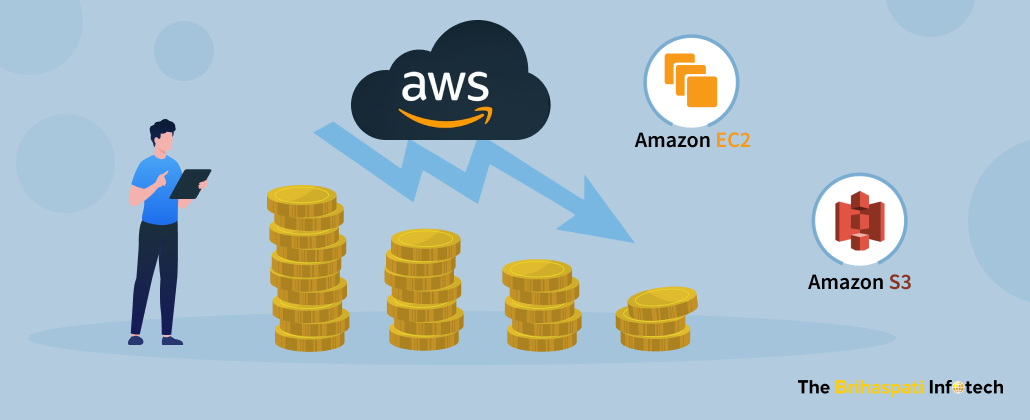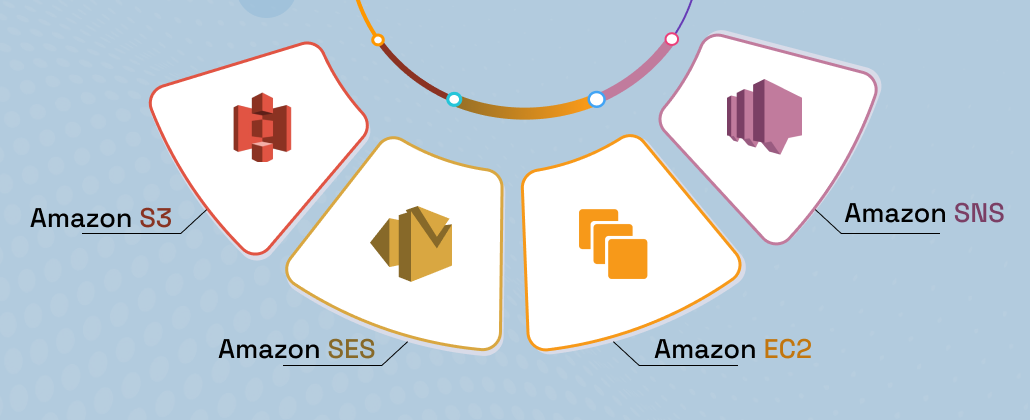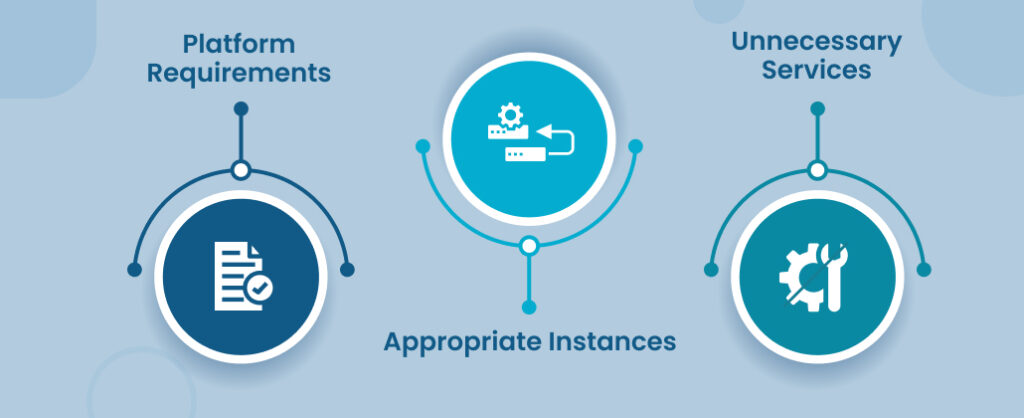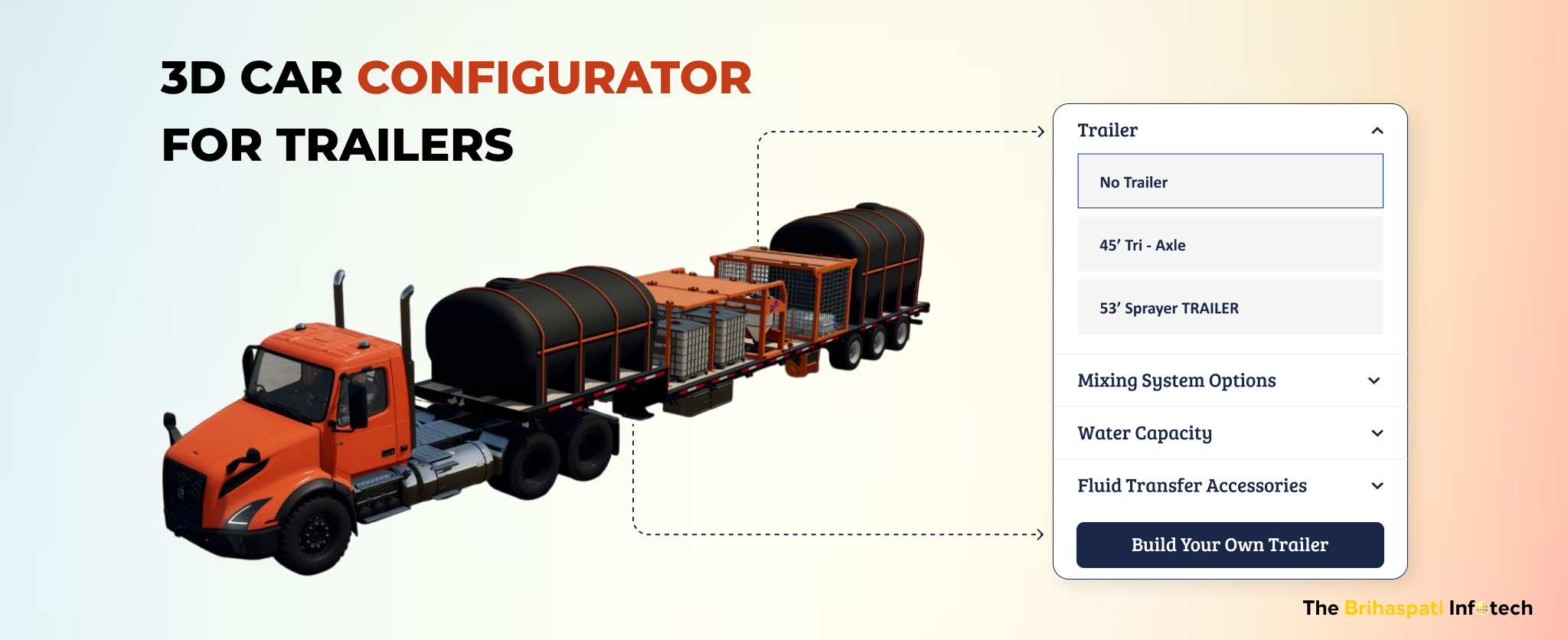
AWS Cost Optimization Tools: Get Better Revenue & Management
Amazon Web Services ( AWS) is a widely used platform for hosting, storage, marketing, and security. Businesses often spend much on these services to develop any website or application. Let’s dive into the AWS cost optimization process to understand how it can help minimize costs and enhance revenue.
Hosting a website or app on Amazon web services can get expensive because you might pay for more resources than you use. Optimizing costs on AWS is key, and consulting AWS experts can help you find efficient strategies to avoid overspending while maximizing the services you need.
Effective Cost Management of Tools & Services You Need

AWS ( Amazon Web Services ), a widely embraced public cloud hosting provider, offers the flexibility to leverage resources based on specific budgets and needs. AWS provides services at competitive rates, facilitating cost savings for users. Amazon AWS billing process and its key instances.
-
EC2 ( Elastic Compute Cloud )
AWS elastic compute cloud (EC2) instances from the backbone of AWS, offering scalable compute capacity in the cloud. The AWS EC2 pricing for providing hosting and storage solutions is much less than other hosting providers like GoDaddy, Hostinger, Bluehost, etc.
Amazon AWS Billing for EC2 is based on various factors, including the chosen instance types, usage duration, data transfer, and additional features. Following is the AWS EC2 pricing model:
-$0.006 per hour for nano instances
-$100 per hour for larger compute-intensive
-
S3 (Simple Storage Service)
Amazon S3 bucket is a highly scalable and versatile object storage service offered by AWS. It is designed to store and retrieve data from anywhere on the web. It is very crucial in AWS cost management and reliable storage solutions. Following are Service classes Of S3 buckets
Standard Storage
Web solutions that need frequent data also require high availability and performance. Amazon simple storage service S3’s standard storage plan can handle high data volume and help to reduce the burden from your main server for a flawless experience. Pricing of this plan:
Storage Volume: $0.023 per GB per month
Data Transfer: $0.09 per GB
API Requests: Additional charges
Infrequent Access Storage
Optimized for data accessed infrequently, providing lower storage costs. Suitable for backups and data that is accessed less often than standard storage. Pricing of this plan:
Storage Volume: $0.0125 per GB per month
Data Transfer: $0.01 per GB
Glacier Storage
Tailored for long-term archival, ideal for data rarely accessed. Provides extremely low storage costs for archival purposes.Pricing of this plan
Storage Volume: $0.004 per GB per month
Data Retrieval: $0.12 per GB
Prices vary across different regions and types of services within AWS. The prices mentioned are general and commonly used benchmarks, yet they are subject to variation based on the specific usage of resources in each case.
-
SES ( Simple Email Service)
Amazon AWS services allow to optimize the platform’s functionalities and enhance the user experience. SES is one of them, nowadays we are highly utilizing email marketing services to boost up sales. SES simplifies email sending and receiving on AWS.
The billing of SES is primarily based on the volume of emails sent and received, with additional charges for attachment data transfer. Billing process of SES:
Pay-As-You-Go
We can utilize the SES service to minimize the cost of email sending and receiving. This is a pay-to-go model in which charges are based on the number of emails sent and received, it is a scalable and cost-effective solution.>
Free tier
AWS provides a free tier of email sending and receiving. Previously capped at 1000 per month, this limit has now been increased to 3000. Every free tier user gets 3000 messages charges each month for the initial first year of using SES. Approx cost of using SES:
-$0.01 per email sent or received
-$0.009 per email for a large volume of emails
-
SNS ( Simple Notification Service )
Another highly practical service within AWS is SNS, which simplifies the creation and control of notifications. Billing hinges on the volume of notifications published and delivered, along with the additional features employed. Opting for the SNS options proves to be an effective approach to reducing costs within the AWS cost optimization process.Amazon AWS Billing Process of SNS:
Pay Per Use
SNS’s billing process is highly dependable for all users, functioning on a pay-per-use model. Users are charged solely when resources are actively in use. The pricing structure is contingent upon the usage pattern and the type of notification service employed.Approx cost of using SNS:
-$0.00015 per notification ( Basic delivery to topics or SQS queues )
Which Hosting Plan is Ideal for Your Platforms?

-
On-Demand Pricing
It is one of AWS’s most popular and fundamental plans. It operates on a pay-as-go model, charging on an hourly basis for resource usage. While this model offers flexibility and immediate access to resources without long-term commitments, it’s essential to monitor usage closely to prevent unnecessary costs from unforeseen spikes in usage.
Who can opt for this plan?
For organizations unwilling to commit upfront payment it is ideal.
Ideal for handling large applications with fluctuating workloads.
-
Saving Plans
It is one of AWS’s most popular and fundamental plans. It operates on a pay-as-go model, charging on an hourly basis for resource usage. While this model offers flexibility and immediate access to resources without long-term commitments, it’s essential to monitor usage closely to prevent unnecessary costs from unforeseen spikes in usage.
Usable Plan for!
Organizations seeking commitment and flexibility in resource usage.
Applications seeking long-term reliability and stability.
-
Reserved Instances
Reserved instances (RIs) enable substantial cost savings for steady-state workloads with a predictable usage pattern. In this plan, Amazon allows you to reserve the resource for 1-3 years and give complementary discounts of up to 75%. By committing to a specific instance configuration for a particular time frame, users can access discounted hourly rates, making RIs a cost-effective option for stable workloads.
Ideal Option For!
Organizations primarily run legacy enterprise applications on the cloud.
Applications that have predictable usage and a predictable growth trend.
-
Spot Instances
Spot instances allow users to bid on unused AWS clouding capacity, often available at up to 90% lower price than On-Demand instances. The pricing for spot instances fluctuates, updating approximately every five minutes. If your bid surpasses the current market price, you gain access to the spot instance.
Preferable Option For!
Organizations equipped with advanced cloud-native development activities.
Applications characterized by high distribution or running non-time-critical workloads.
Best Practices of AWS Cost Optimization

There are several Amazon AWS services available, but it is crucial to choose all these service packages according to the requirements.
-
Understanding Platform Requirements
Understanding your platform’s needs is key before incorporating AWS with your website or platform. This understanding ensures informed decisions when selecting the most suitable services. However, Amazon cloud storage is very useful, but it does require a good grasp of instance usage and necessary services for optimal deployment.
-
Use Appropriate Instances of AWS
Amazon Elastic Compute Cloud (EC2) is the broadest computing platform with over 750 instances for managing the workload. So it is important to understand the needs before going with any invaluable service for your platform.
-
Avoid Using Unnecessary Services
There are many services available for different operating systems to optimize performance. Many third-party solutions claim to provide cutting-edge solutions by paying extra for their services but it also increases the overall cost.
However, in the AWS cost optimization process, we identified the necessary services based on the platform requirement and utilized them accordingly. It helps to minimize the cost and improve the platform’s performance.
Following are some additional strategies for an effective AWS cost management
- Analyze payment reports and calculate the expenses
- Track & create purchase orders
- Track past payments and manage dues
- Utilized unused credits on appropriate resources
- Create multiple payment accounts for different service providers
Ready For AWS Cost Optimization?
Our team comprises a robust lineup of AWS-certified experts, including AWS solution architects, cloud practitioners, and seasoned developers. At TBI, we are providing exceptional Amazon cloud storage consulting services.
Get in touch with our experienced AWS experts to discover how you can harness the power of AWS cost management to your business’s advantage.
Stay Tuned for Latest Updates
Fill out the form to subscribe to our newsletter











